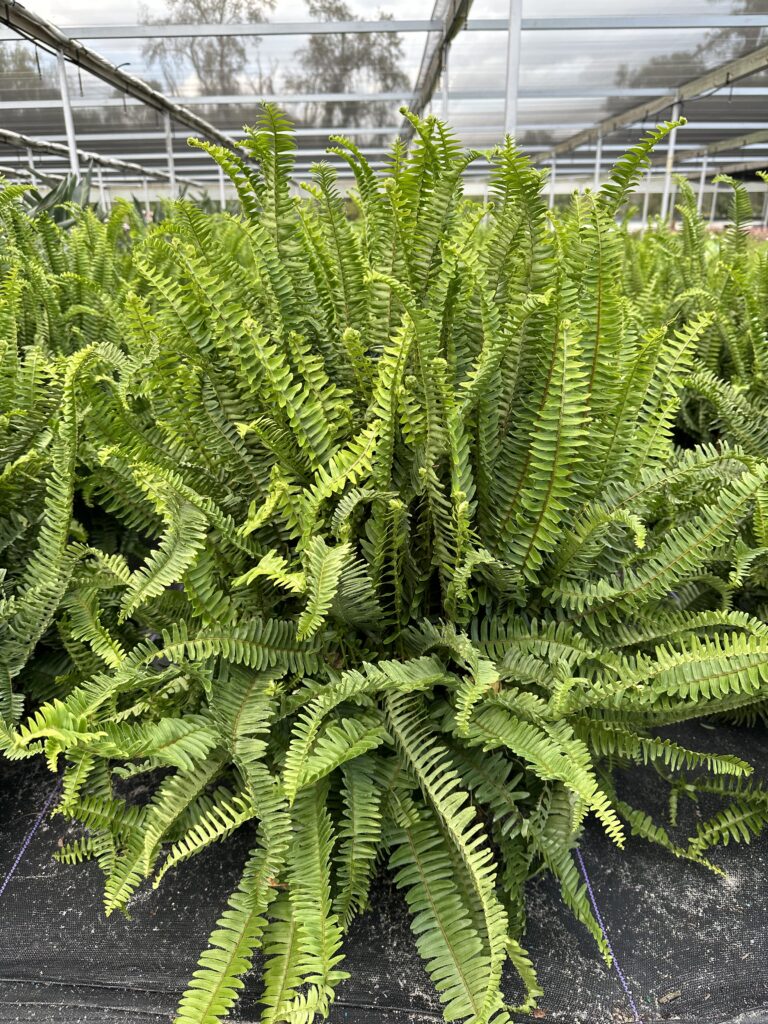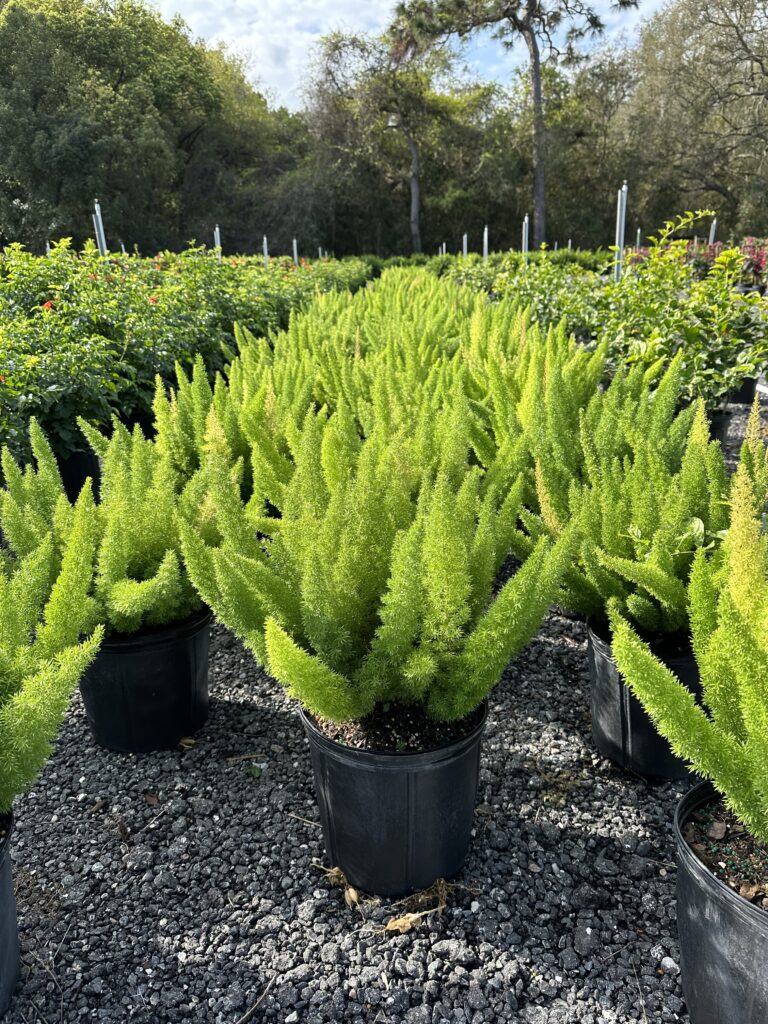

Ferns are a popular plant inside and outside of the home known for their lush, feathery fronds and graceful appearance. Native to tropical regions, ferns have become popular as ornamental plants worldwide due to their aesthetic appeal and relatively easy-care requirements.At Shane Tinker Enterprises, Inc., we offer the healthiest 10″ pot Boston and Foxtail ferns. Here is what you should know to take care of these varieties of fern plants.
Boston Ferns
Scientifically known as nephrolepis exalata, Boston ferns are a popular ornamental plant characterized by their arching, lance-shaped fronds that can grow up to 3 feet long, creating a cascading effect as they mature. The fronds are composed of many small, intricately arranged leaflets (pinnae) that give them a delicate, airy look. The overall shape of the plant is bushy and symmetrical, making it an attractive choice for both indoor and outdoor gardens.
Environmental Requirements:
- Light. Boston ferns prefer bright, indirect light. They can tolerate some morning sun but need protection from intense afternoon sunlight, which can scorch their delicate fronds.
- Temperature. These ferns thrive in temperatures between 60°F to 75°F They are sensitive to drafts and sudden temperature changes, so it’s essential to keep them in a stable environment.
- Humidity. High humidity levels are crucial for Boston ferns. They appreciate regular misting or placement in humid environments such as bathrooms or kitchens. Dry air can cause their fronds to brown and wither.
- Watering. Keeping the soil consistently moist is key to maintaining a healthy Boston fern. They don’t tolerate drying out completely, but they also don’t like sitting in waterlogged soil. Regular watering, allowing the top inch of soil to dry slightly between waterings, is ideal.
- Soil. A well-draining potting mix rich in organic matter, such as peat moss or compost, is recommended. This helps retain moisture while preventing water-logging.
Maintenance
Boston ferns benefit from regular grooming to remove old or yellowing fronds and encourage new growth. Pruning dead or damaged leaves also helps maintain their aesthetic appeal and overall health. Fertilize with a balanced liquid fertilizer diluted to half-strength during the growing season (spring and summer) to promote lush foliage.
Propagation
These ferns can be propagated through division or spores. Division involves separating the crowded clumps of the plant into smaller sections, each with roots attached. Spores can be collected from mature fronds and planted in a moist, sterile medium to grow new ferns.
Uses
Boston ferns are commonly used as indoor plants, either in hanging baskets or as floor plants in larger containers. Their graceful appearance makes them suitable for enhancing the aesthetics of homes, offices, and indoor garden spaces. Outdoors, they thrive in shaded or partially shaded areas with high humidity, such as under trees or in sheltered garden beds.
Foxtail Ferns
Foxtail ferns, scientifically known as Asparagus densiflorus ‘Myersii’, are distinctive plants that belong to the asparagus family rather than true ferns. Despite their name, they are not ferns but are often grouped with ferns due to their fern-like appearance and growth habits.
Foxtail ferns are prized for their fluffy, plume-like fronds that resemble a cascade of delicate green needles. These fronds grow densely from the center of the plant in a distinctive upright manner, giving the plant its characteristic “foxtail” appearance. The fronds can reach heights of up to 2 to 3 feet and form a rounded, bushy shape.
Environmental Requirements:
- Light. Foxtail ferns prefer bright, indirect light but can tolerate some morning sun. They are more adaptable to varying light conditions compared to true ferns, making them suitable for both indoor and outdoor settings.
- Temperature. These plants thrive in temperatures ranging from 55°F to 75°F. They can tolerate occasional drops in temperature but prefer to be kept away from drafts and extreme fluctuations.
- Watering. Foxtail ferns require regular watering to keep the soil evenly moist. They are more drought-tolerant compared to true ferns but should not be allowed to dry out completely. During the growing season (spring and summer), water when the top inch of soil feels dry. Reduce watering in the winter months but ensure the plant doesn’t become completely dry.
- Humidity. While they appreciate some humidity, foxtail ferns can adapt to average indoor humidity levels. Misting occasionally or placing a humidity tray nearby can help maintain adequate moisture levels around the plant.
- Soil. A well-draining potting mix is essential for foxtail ferns. A mix of peat moss, perlite, and sand or a commercial potting mix for ferns and palms works well. Ensure the pot has drainage holes to prevent water-logging.
Maintenance
Regular grooming helps keep foxtail ferns looking tidy and encourages healthy growth. Remove any yellow or brown fronds by trimming them back to the base of the plant. Pruning also helps maintain the plant’s shape and encourages new growth from the center.
Propagation
Foxtail ferns can be propagated through division or from seeds, though division is more common and straightforward. Divide mature plants carefully, ensuring each division has a healthy root system attached. Plant divisions in fresh potting mix and keep them moist until new growth emerges.
Uses
Foxtail ferns are versatile plants that can be grown indoors as well as outdoors in gardens or containers. Indoors, they thrive as ornamental houseplants, adding a touch of lush greenery to living spaces. Outdoors, they can be used as ground covers, border plants, or in mixed plantings. Their unique texture and form make them popular choices for adding interest and visual appeal to garden beds and landscapes.
Boston and Foxtail ferns are admired for their striking appearance, ease of care, and versatility in various growing conditions. Whether adorning a living room corner or brightening a shaded garden spot, these plants bring a delightful charm and vibrancy wherever they are planted.
If you have any questions about Boston ferns or Foxtail ferns, or are interested in placing an order, please give us a call at (352) 735-8350.
